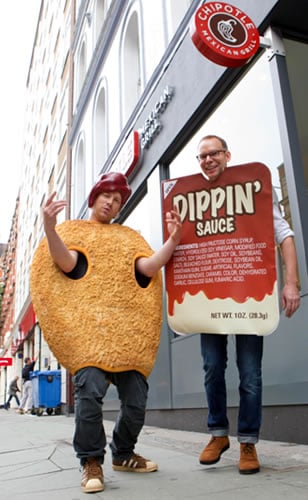Food with Integrity
Oct 28, 2010, Updated Dec 10, 2016
Catherine Enfield is a food blogger from Sacramento, California, writing at Munchie Musings about everything from recipes to food trucks. During October: Unprocessed, she realized she could “safely” eat at Chipotle restaurants because their food fits the definition of unprocessed ingredients. Last week she came across their “Boorito“ processed food costume contest and decided to talk to her friend, Nicole Rogers — who happens to be a Chipotle corporate employee. Today, she shares a little of what she learned.
If you just discovered October: Unprocessed, welcome! Find out more and take the pledge. Don’t worry about joining late — you can start your 30 days today or simply join in for the rest of the month.

It’s sad to think that America needs to have a Food Revolution. That our diets have so deteriorated over the last 50 years that eating unprocessed, natural, whole foods is considered revolutionary. What have we done to ourselves?
And who is leading the Food Revolution (FR) both here and in the United Kingdom? A Brit. Chef Jaime Oliver started the FR in his native England when he wanted to change their school lunches to healthy, wholesome food. Here in the U.S. he is being joined by a new partner, Steve Ells and Chipotle Mexican Grills.
This Halloween Chipotle has a promotion called: Boorito 2010: The Horrors of Processed Food. Dress up as a scary processed food and go to Chipotle on Halloween between 6 and 10 p.m. and you can get an Un-processed burrito for only $2. That $2 will then be donated to the Jaime Oliver Food Revolution program – up to $1 million! There’s also the opportunity to win some great prizes, including a grand prize of $2,500.
“We’ve been doing Boorito costume promotions for the last ten years.” says Nicole Rogers, Marketer for the Sacramento and Central Valley Chipotles. “In the past you dressed up as your favorite Chipotle food item. But this year we wanted to help Jamie Oliver spread the message about the scariness of processed food. We also figured that we already give away so much great food during our Boorito promotion that we should also give away the proceeds to a cause that matches our own corporate vision.”
At the heart of the FR is the strategy to get people to replace processed foods with fresh, healthy, unprocessed food, both at home at and when eating out. Chipotle is the only fast food chain that is committed to using unprocessed, quality ingredients from sustainable sources.
All of the animals used to produce their meats are hormone and antibiotic free. They also try, as much as possible, to use only farms where the animals are pasture raised and not kept in confining pens. This has proven to be a challenge as there are still many farms that need to be converted back to this type of rearing. The livestock is fed vegetarian feed as well. And it’s comforting to know that if an animal gets sick, that animal is treated, but it is pulled from the Chipotle stock so that it will never enter their food stream.
When it comes to dairy products, the cows are also hormone and antibiotic free and as free roaming as possible. One of the hormones used by many dairy cattle ranches is rBGH, a hormone that increases the milk production so that a cow has to be milked up to five times a day! Not so with Chipotle dairy cows. Being hormone free, they only need to be milked twice a day – the way it’s been done for thousands of years!
The produce used by Chipotle is almost all organic. Yay! No pesticides on that lettuce or salsa ingredients. Unfortunately we had to say “almost” because in the case of the beans they have only been able to find 40% of them organic. There is still a need to find more growers to supply organic beans.
But word is getting out. After all, everything is based on supply and demand. Farmers are realizing there is an ever growing market for organic produce and meats. They just have to meet Chipotle’s high standards, which are stricter than the USDA’s.
“We hope to be able to get to 100% organic and 100% cage free animals as soon as we can find the suppliers.” Says Rogers. We hope so too.
—
Check out my Menu Monday post for the healthiest choices at Chipotle.




















Ah yes, and thanks for the other links!
Luckily I can produce most of my own vegetables in my garden and can do so about 8 months of the year. Otherwise … “know thy farmer.”
@ Andrew
Kudos to you for taking the time to look it up. Today we are bombarded with so many labels that lack meaning or confuse consumers.
I’ve also seen the USDA PDFs which are hard to decipher and you really have to dig to find any meanigful information. But they do have a PDF somewhere on their website that lists allowed pesticides by crop/insect in order to meet USDA organic standards.
Hi Magdalena, I just spent about ten minutes trying to find the PDF you mentioned, and finally gave up. I then hopped on over to Wikipedia’s page on Organic Food, and found this: “Organic farming standards do not allow the use of synthetic pesticides, but they do allow the use of specific pesticides derived from plants. The most common organic pesticides, accepted for restricted use by most organic standards, include Bt, pyrethrum and rotenone.” (emphasis added) So indeed, it seems you are correct. Organic means no synthetic pesticides, but it does NOT mean completely pesticide-free. Nevertheless, Organic foods generally have significantly lower amounts of pesticide-residue than their non-certified-organic counterparts. (See #2 on this USDA page). Thanks for getting me to look this up — it’s definitely an important distinction to understand! While we’re on the subject, the Environmental Working Group’s Shopper’s Guide to Pesticides is a handy list of 49… Read more »
Try this:
The Organic Foods Production Act of 1990 requires the Secretary of Agriculture to establish a National List of Allowed and Prohibited Substances which identifies synthetic substances that may be used, and the nonsynthetic substances that cannot be used, in organic production and handling operations.
http://www.ams.usda.gov/AMSv1.0/ams.fetchTemplateData.do?template=TemplateN&navID=NationalListLinkNOPNationalOrganicProgramHome&rightNav1=NationalListLinkNOPNationalOrganicProgramHome&topNav=&leftNav=&page=NOPNationalList&resultType=&acct=nopgeninfo
Cheers!
Ah, yes, now we’re getting somewhere…
§ 205.271 Facility pest management practice standard.
And a little further down the list is…
§ 205.601 Synthetic substances allowed for use in organic crop production.
All of this to say, the rules do seem to state that other options must be exhausted first, but then some synthetic or non-synthetic pesticides may be used (if they’re on the “allowed” list).
So the bottom line is yes, you’re right. Organic does NOT require “pesticide-free.” However, it’s does seem to mean tjat much less pesticides, and maybe “less-bad” pesticides are going to be used.
Bottom line, with regards to Organic and Pesticides? Organic does mean “better,” even if not “best.”
“The produce used by Chipotle is almost all organic. Yay! No pesticides on that lettuce or salsa ingredients.”
Organic does not equal pesticide-free.
Interesting – I always thought that it did exclude all pesticides. I did a bit of Googling and came to the USDA website on Organic certification. I found a PDF document here that says:
“Organic crops are raised without using most conventional pesticides, petroleum-based fertilizers, or sewage sludge-based fertilizers.”
So ignoring the vague qualifier “most” (what the heck?!) for a moment, what pesticides can be used on Organic crops?
good to hear a a company like chipotle is doing their part by supporting hormone and antibiotic free meat. im a vegan but when i did eat meat it was almost impossible for me to find that alternative… its part of one of the reasons i became vegan.
Hi Kendall,
Thanks for the comment. I definitely agree that it’s laudable what Chipotle is doing. Now, if we can just get them to reduce their portion sizes! (The tortillas alone — sans filling — are nearly 300 calories!). My advice to anyone going to Chipotle is to get a bowl instead of a burrito, go easy on the rice, and of course load up on the veggies. 🙂
– a.